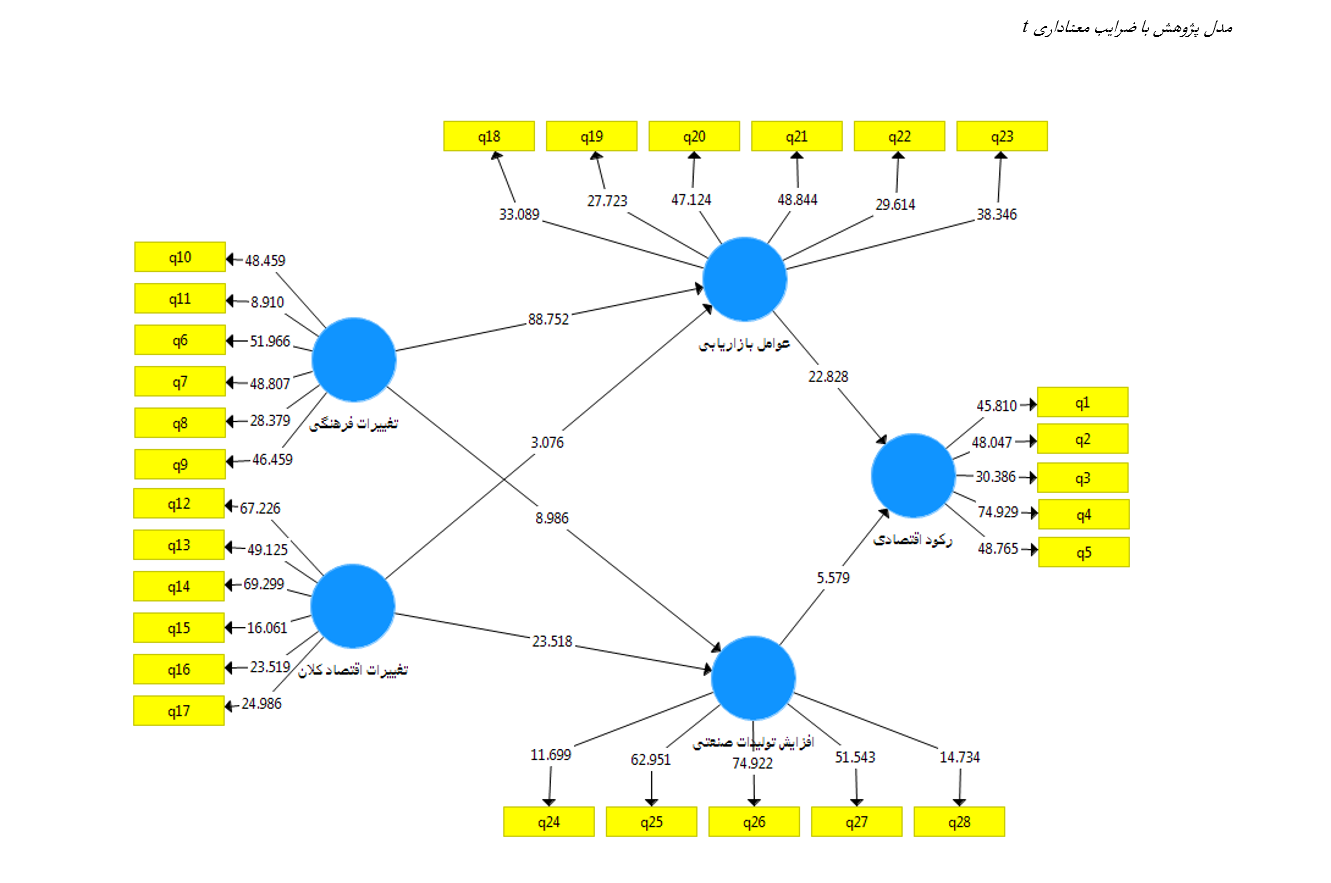Analysis of the Impact of Cultural Changes and Macroeconomic Changes on the Economic Recession of Handicrafts in Shiraz, Emphasizing the Mediating Role of Marketing Factors and Industrial Production Growth
Keywords:
Industrial production growth, cultural changes, macroeconomic changes, economic recession, handicrafts, marketing factorsAbstract
The aim of this study is to analyze the impact of cultural changes and macroeconomic changes on the economic recession of handicrafts in Shiraz, with an emphasis on the mediating role of marketing factors and industrial production growth. This study, based on its objective, is applied research, and in terms of data collection methods, it is considered descriptive-survey research. The statistical population includes all artists and craftsmen in the field of handicrafts in Shiraz. The participants were 384 artists and craftsmen (155 men, 229 women) in Shiraz in 2024, who were selected using Cochran’s formula and convenience sampling. They completed scales measuring cultural changes, macroeconomic changes, marketing factors, industrial production growth, and economic recession. Structural equation modeling was utilized for data analysis using Smart PLS and SPSS software. The findings showed that cultural changes indirectly affect the economic recession through the mediation of marketing factors. Cultural changes also indirectly affect the economic recession through the mediation of industrial production growth. Additionally, macroeconomic changes indirectly affect the economic recession through the mediation of marketing factors. Furthermore, macroeconomic changes indirectly affect the economic recession through the mediation of industrial production growth. Cultural and macroeconomic changes, mediated by marketing factors and industrial production growth, can influence the economic recession of the handicrafts sector in Shiraz. Overall, it can be said that the greater the extent of changes and crises in the identified dimensions, the greater the economic recession in the handicrafts sector of Shiraz will be.
Downloads
References
Ataei Pour, F. (2019). The Role of Handicrafts in Urban Tourism Industry Development: A Case Study of Shiraz City
Islamic Azad University, Marvdasht Branch]. https://civilica.com/doc/2064440/
Faqih, A. (2017). Examining the Factors Affecting the Development of Handicrafts in Bushehr Province School of
Science and Arts]. https://www.uniref.ir/University71-PAPER-1400
French, J. (2019). Strategic social marketing: For behaviour and social change. Sage Publications.
https://uk.sagepub.com/en-gb/eur/strategic-social-marketing/book260452
Ghanbari, A., Aziza Abadi Farahani, F., Rezaei, A. A., & Salehi Amiri, R. (2023). Strategies, Approaches, Challenges,
and Outcomes of Handicrafts Based on Tourism Development Using Grounded Theory Method. Cultural Tourism,
(14), 29-18. https://www.toc-sj.com/article_180298_1b74dd549a5357b1b626b12fc2e9d005.pdf
Ghorbani, F. (2020). Identifying and Analyzing Entrepreneurship Opportunities in Handicrafts of Shushtar County
University of Science and Arts]. https://civilica.com/p/179254/
Haugh, H. M., & Talwar, A. (2016). Linking social entrepreneurship and social change: The mediating role of
empowerment. Journal of Business Ethics, 133, 643-658. https://doi.org/10.1007/s10551-014-2449-4
Hitomi, K. (2017). Manufacturing systems engineering: a unified approach to manufacturing technology, production
management and industrial economics. Routledge. https://doi.org/10.1201/9780203748145
Jamir, I. (2024). Impact of global financial crisis on Indian handicrafts exports: A breakpoint analysis. Global Business
Review, 25(2_suppl), S103-S120. https://doi.org/10.1177/0972150920954612
Khan, W. A., & Amir, Z. (2013). Study of handicraft marketing strategies of artisans in Uttar Pradesh and its implications.
Research Journal of Management Sciences. https://www.semanticscholar.org/paper/Study-of-HandicraftMarketing-Strategies-of-in-and-Khan-Amir/70cb98454247745bacee0b5bf5059ae1daa560ea
Kheiri Doost, Z., Momeni, F., Khadem Ali Zadeh, A., & Nasiri, B. (2021). The Relationship Between Cultural Changes
and Economic Development. Social Studies, 10(1), 215-193. https://ijes.shirazu.ac.ir/article_6411.html?lang=fa
McMichael, P., & Weber, H. (2020). Development and social change. Sage Publications. https://uk.sagepub.com/engb/eur/development-and-social-change/book257693
Redzuan, M., & Aref, F. (2011). Constraints and potentials of handicraft industry in underdeveloped region of Malaysia.
African journal of business management, 5(2), 256. https://academicjournals.org/journal/AJBM/article-full-textpdf/4B572AC15919
Shafi, M., Junrong, L., Yang, Y., Jian, D., Rahman, I. U., & Moudi, M. (2021). Factors influencing the consumer
acceptance of innovation in handicraft products. Sage Open, 11(4), 21582440211061528.
https://doi.org/10.1177/21582440211061528
Shahab, S., Nawab, H. U., & ul Mulk, J. (2024). Crafting Perspectives: Decline of Local Handicrafts in Chitral District,
Khyber Pakhtunkhwa. Pakistan Social Sciences Review, 8(1), 01-16. https://doi.org/10.35484/pssr.2024(8-I)01
Tahsili, H. (2018). Analyzing the Economic Characteristics of Handicrafts. Third National Conference on Economics,
Management, and Accounting, Shahid Chamran University of Ahvaz.
Yadav, U. S., Tripathi, R., Yadav, G. P., & Tripathi, M. A. (2022). Proposal of a global handicraft index for sustainable
development: a visionary approach for small industry and developing strategies for handicraft (rural industry).
European Journal of Sustainable Development Research, 6(2), em0185. https://doi.org/10.21601/ejosdr/11909

Downloads
Published
Submitted
Revised
Accepted
Issue
Section
License
Copyright (c) 2024 Journal of Technology in Entrepreneurship and Strategic Management (JTESM)

This work is licensed under a Creative Commons Attribution-NonCommercial 4.0 International License.










